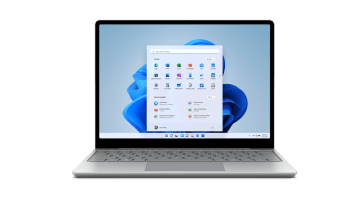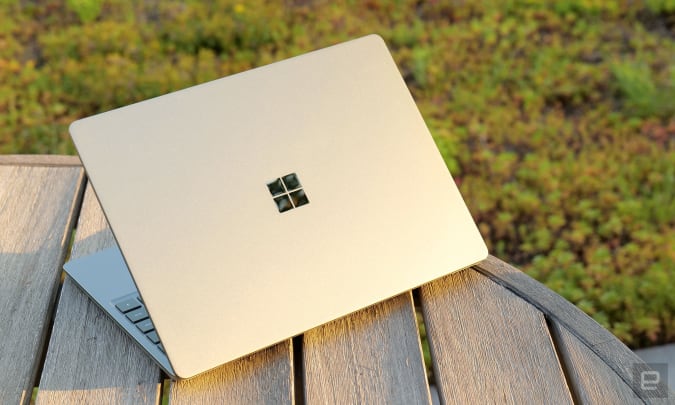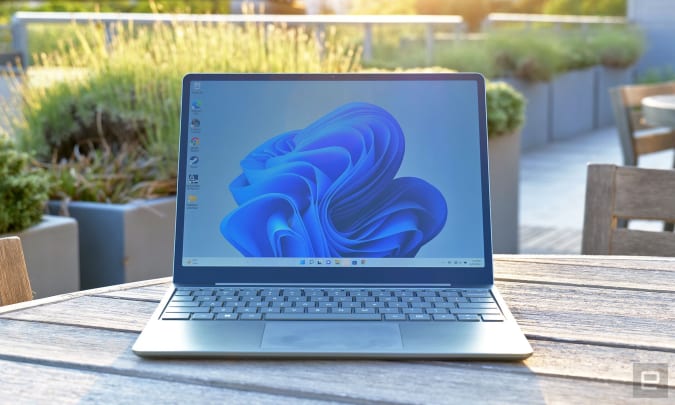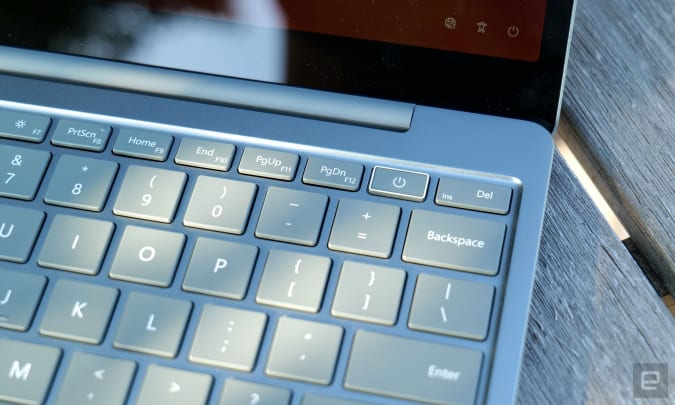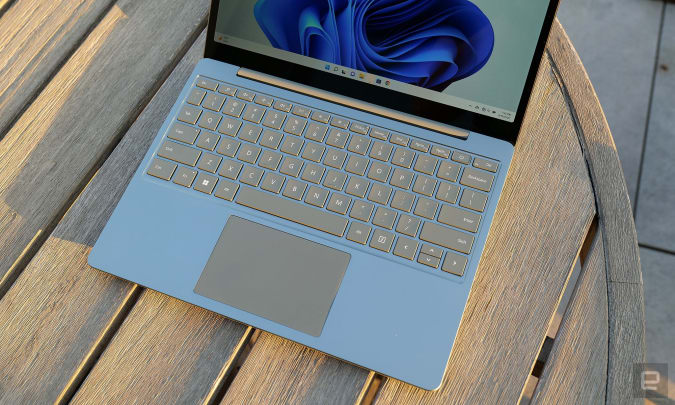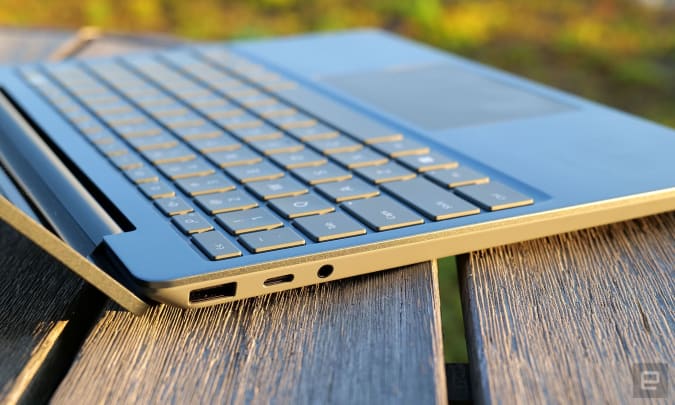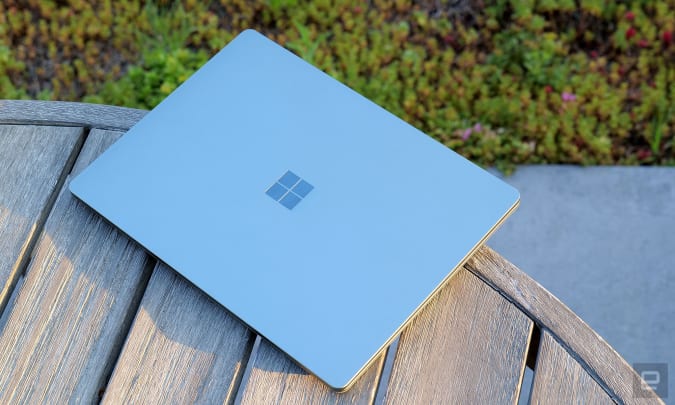The word basic gets a bad rap. But there’s something to be said for simple devices that deliver everything you need without a bunch of costly extras. So while the new Surface Laptop Go 2 isn’t as flashy as the Surface Studio or as flexible as a Surface Pro 8, it delivers all the essentials for a very affordable price. And thanks to a refreshed CPU, upgraded storage, redesigned fans and a starting price of just $600, now you get even more for your money.
design
Not a lot has changed about the design, and I don’t care because it’s basic in the best ways. You still get that super minimalist Surface aesthetic in a light 2.5-pound body. Microsoft uses aluminum on its lid and deck, but a plastic bottom helps keep its price down. Inside, the 12.4-inch PixelSense display has slim bezels, and while the Laptop Go 2’s keycaps and touchpad are a bit smaller than what you’d get on a bigger Surface, it never felt cramped. That said, I think not adding backlighting to the keyboard was a bit too frugal on Microsoft’s part. It’s 2022: Backlit keys should be standard, regardless of price.
pros
- Slick design
- Supports charging over USB-C
- Lightweight
- Bright screen
- Good battery life
- Improved performance
cons
- No backlit keyboard
- Limited port selection
- Base model only has 4GB of RAM
Sam Rutherford/Engadget
Now, I must admit that the port selection does feel a bit limited. All you get is one USB-A connection, one USB-C socket, one headphone jack and one magnetic Surface Connect slot. My ideal laptop has at least three USB ports. And unlike its bigger siblings, the Surface Laptop Go 2 doesn’t have a bonus USB-A port on its power brick, which would be really handy for when you want to recharge an extra accessory. On the bright side, the Laptop Go 2 does support USB-C power delivery, so if you want, you can easily switch out Microsoft’s included brick for a third-party charging adapter.
I also want to mention that while our higher-end review unit does come with a fingerprint sensor built into its power button, you won’t get that on the base model. Again, I know Microsoft is trying to keep costs down, but this should really be available on every config.
Display, web cam and sound
Sam Rutherford/Engadget
As for the display, Microsoft stuck with the same 1,536 x 1,024 touchscreen it used on the old model. No, it’s not even full HD, but colors are vibrant, and while Microsoft claims a brightness of 330 nits, our review unit actually registered a much more impressive 375 nits. So kudos to Microsoft for exceeding its nominal specs. Would I prefer a slightly higher resolution? Of course. But on a 12.4-inch screen, things still look pretty crisp. From a normal viewing distance, you don’t really notice the lower pixel density.
Microsoft also says the Laptop Go 2 speakers are 24 percent louder than before, and that feels about right. You’re not going to see any obvious speaker grilles because everything is hidden beneath the keyboard. But audio still comes through quite clearly, even if the soundstage comes off a bit shallow with less detail in the highs and lows that I’d like. But on a system that starts at $600, I’m satisfied.
Sam Rutherford/Engadget
The Laptop Go 2’s webcam is still just 720p, but Microsoft says there’s a new sensor inside that improves contrast and color saturation. And you know what it does. I still maintain that a 1080p webcam should be the minimum. But unless you’re live streaming on Twitch or something, which is sort of outside the system’s intended use case, this webcam is plenty capable.
performance
The most important improvements on the Surface Laptop Go 2 are to its performance. Microsoft has upgraded to an 11th-gen Intel Core i5 CPU, which isn’t cutting edge, but has more than enough oomph to ensure general productivity feels snappy. Compared to a bigger machine like the HP Specter x360 with an i5-11390H chip, the Laptop Go 2’s scores were only around 10 percent lower on general performance tests like PCMark 10 and Geekbench 5. Though its lack of discrete graphics holds it back during more demanding tests or workloads.
|
Laptop |
PCMark 10 |
Geekbench 5 (single core/multi core) |
3DMark Night Raid |
|
Surface Laptop Go 2 |
4,213 |
1.349/3.764 |
11.173 |
|
HP Specter x360 16 |
4,785 |
1.518/4.200 |
16,927 |
|
Surface Pro 8 |
4,542 |
1289/5,217 |
16,092 |
|
Surface Laptop Studio |
5,397 |
1.445/5.430 |
26,566 |
Sadly, Microsoft stuck with just 4GB of RAM on the base model, which is a bit skimpy, and is probably why the company sent out a higher-spec model with 8GB of RAM for review. And if you decide to pick one up, you should probably pay $100 for that upgrade. Meanwhile, the biggest change is that the Surface Laptop Go 2 now comes with a 128GB SSD standard, instead of the 64GB eMMC drive you got before. So you get faster storage and more of it, even on the base model.
Sam Rutherford/Engadget
In the real world, the Surface Laptop Go 2 has no issues quickly switching between a bunch of browser tabs, multiple office apps and more – which is really all I’m asking for in a system like this. And thanks to its integrated Intel Iris Xe graphics, you can even do some light video editing and casual gaming, though anything more is definitely pushing it.
Battery life and thermals
Sam Rutherford/Engadget
Battery life on the Surface Laptop Go 2 is strong, lasting 14 hours and 43 minutes on our video rundown test. That’s even longer than what you get with more expensive Surfaces, including the Surface Pro 8 (13:06) and the Surface Laptop Studio (12:24). However, if longevity is your main concern, the 15-inch Surface Laptop 4 still has a bit of an edge with a time of 15:25 on our test.
|
Laptop |
battery life |
|
Surface Laptop Go 2 |
14:43 |
|
Surface Laptop 4 (15-inch) |
15:25 |
|
Surface Pro 8 |
13:06 |
|
Surface Laptop Studio |
12:24 |
I also appreciate that Microsoft made efforts to reduce the system’s fan noise, by as much as 10 decibels at max speeds. In normal use, the Laptop Go 2 is actually rather quiet, often running completely silent if you’re just browsing the web, and rarely rising above a whisper unless you’re doing some serious multi-tasking. In some respects, this laptop seems like the ideal candidate for a fully fanless design. That said, Windows machines don’t have access to the same kind of super-efficient chips you get from something like an M1 MacBook Air. But let’s not forget, an equivalent MacBook Air also costs $200 more than the Surface Laptop Go 2.
wrap up
Sam Rutherford/Engadget
And in a way, that’s important context when comparing Microsoft’s most travel-friendly notebook to more expensive rivals. For someone like me who uses a desktop at home, the Surface Laptop Go 2 is a great travel companion and I’d much rather drag it around than the bigger and heavier Intel MacBook Pro 13 I got assigned for work. Sure, it’s not quite as powerful and it’s got a lower-res screen, but it has more than enough performance for working on the go. It’s also a great machine for students or anyone who just wants a well-designed no-frills notebook that’s easy to carry. It doesn’t have an IR webcam for facial login or a stylus like you get on more sophisticated surfaces, but that’s okay. Even if you pay for an upgraded model (which I highly recommend), the Surface Laptop Go 2 is still super portable, very affordable and even kind of stylish, while also having all the basics down pat.
All products recommended by Engadget are selected by our editorial team, independent of our parent company. Some of our stories include affiliate links. If you buy something through one of these links, we may earn an affiliate commission.
